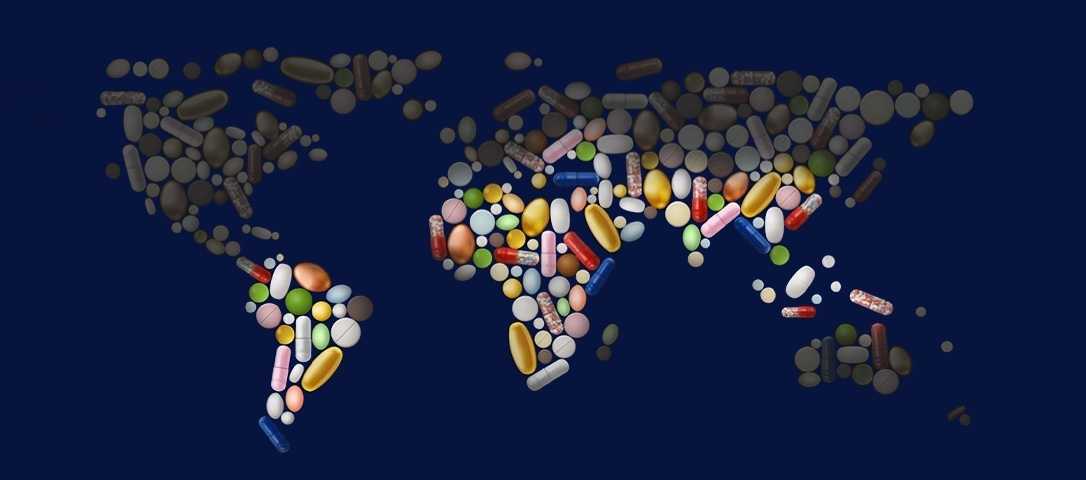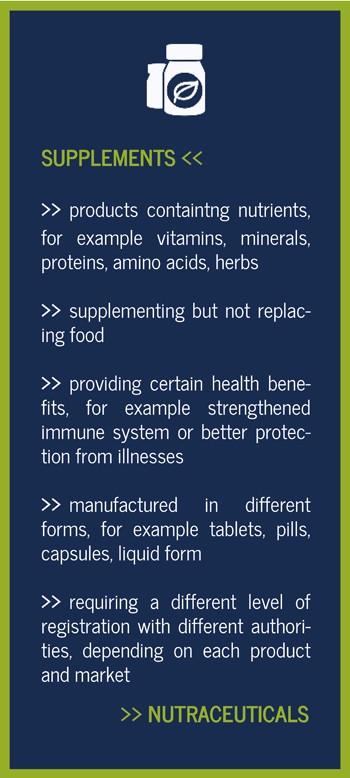Trillion-Dollar Reason Why You Should Supply Supplements to Emerging Markets

Contents Overview
In 2018, the dietary supplements market was worth almost $125 billion USD. By 2025, this number will likely double, reaching a stunning $280 billion USD. For decades, nutritional supplements have been growing in popularity, but only within the last several years has nutraceutical product sales taken the market by storm, annually growing at 9.6%. Due to globalization and continuous advancements in healthcare awareness and education, most of the increase has and will continue to happen in developing countries. Moreover, the Asia-Pacific market is expected to grow at the highest annual growth rate of 9.2% during the forecasted period (2018 to 2025). Health has become both a lifestyle choice and a thriving consumer market.
Once only at the verge of basic healthcare development, the emerging regions are today adopting much of the western city-oriented lifestyle. And not only that urban living is affecting dietary habits, it is also changing health conditions that populations in developing countries are facing. Add into the equation deteriorating access to affordable healthcare and more education about the benefits of disease prevention, the explanation for the explosive growth seems quite obvious. Additionally, malnutrition and vitamin deficiencies are still much too common in poorer communities. There, despite many efforts from worldwide charities, many people still lack access to proper nutrition and therefore require supplementation. Distributing Vitamins & Minerals is thus still essential, and distributors should capture this incredible opportunity. The World Health Organization actually estimates, that focus on nutrition within health services could save 3.7 million lives by 2025, according to a recent report.
The World Health Organization estimates, that focus on nutrition within health services could save 3.7 million lives by 2025, according to a new report
There are also several predictions nutraceuticals will play an important role in preventive healthcare of the future, no matter the region. People of all backgrounds are beginning to understand the health benefits of supplementation, and are becoming more active in their efforts to consume essential nutrients on a daily basis. Healthcare has become a lifestyle choice for many. Furthermore, as the populations are aging worldwide, more and more research linking an unhealthy diet to illnesses is being conducted.

Future will likely bear no lack of evidence connecting conditions like diabetes or cardiovascular disease with our diet. Encouraging people to make healthier choices when it comes to exercise and food, as well as getting the much-needed nutrients from supplements, will therefore increase. It could even prevent more people from ever getting ill. For this, there should be no lack of incentives for the development of new nutraceutical products and possibly even devices.
Since the shift from treatment to prevention in healthcare is happening, and consumers have more attention on nutraceuticals than ever, now it’s the perfect time for new distribution businesses to get involved. As the industry expands, it will be crucial for all the players to assure a steady supply chain flow, especially of the essential supplements like extracts, amino acids or fatty acids, such as omega-3 fish oils.
Since the shift from treatment to prevention in healthcare is happening, and consumers have more attention on nutraceuticals than ever, now it’s the perfect time for new distribution businesses to get involved. As the industry expands, it will be crucial for all the players to assure a steady supply chain flow, especially of the essential supplements like extracts, amino acids or fatty acids, such as omega-3 fish oils.
Even if the increase of the industry sales can be quickly explained simply by globalization, there are four more precise reasons for the increased demand of supplements in the developing markets.
Reason #1

Changing Lifestyles and Social Patterns
One of the major effects on the demand is, undoubtedly, the rise of populations in developing regions. While there is a worldwide trend in the increasing number of people, research by Roland Berger finds that developing regions will account for 97% of the world’s population growth. Until 2030, 1.2 billion more people will be living there, in comparison with 2013. India, for example, is predicted to become the most populated country by 2024. Other key countries of growth include Nigeria, Brazil, and China.
With all this, mega-cities are growing, and the urban lifestyle is becoming more and more prevalent. Estimations show that 56% of developing countries' population will live a city life by 2030. Changing habits and daily patterns have led to less healthy and fresh diets, which usually lack the required nutrition intake. In addition, there has not been enough awareness of the issue. However, this has started to change, and a knowledgeable distributor of supplements, who consistently educates the market besides providing essential vitamins, could thrive. With the marketing support of AdvaCare as your selected manufacturer, this should easily be a manageable task.
Note, in most countries, the social transformation has lead to undeniable increase and capital power of the middle-class population. Consequently, the rising disposable incomes and more and more interest in preventive measures when it comes to health can surely be beneficial for business growth. People are realizing food that meets the required nutritional levels is not easy to find. Not only the countries are struggling to feed their nations with adequate supplies, but urbanization has also made it harder for people to appropriately exercise, prepare meals, grow fresh produce, or avoid stress. The issues that have been true for many in the westernized world are now attacking developing populations too.
This is why, supermarkets and other types of retailers, for example, online stores, across all markets, are broadening the range of their health and wellness products. And while the developed countries still have the lead in sales numbers of nutraceuticals and healthcare services, emerging ones are the fastest in the year-to-year growth.
With more and more working population, spending eight or more hours in sedentary positions in offices across many recently expanded mega-cities, influence on general health is obvious. Therefore diseases, once only known to developed markets, are there as well. Diabetes and cardiovascular diseases, for example, go hand in hand with obesity. Today Egypt is the country with the highest number of obese adults. Nevertheless, with more money on hands but less health in the body, consumer orientation is shifting. More conscious choices are being sought out, which are not only increasing the well-being of individuals but also bringing in higher revenues for dietary supplement sellers and wellness service providers.
Reason #2
Deteriorating Access to Affordable Healthcare
Unfortunately, prevention measures ensuring better overall health have become necessary, with many not being able to afford proper care despite higher income. With a higher density in some urban areas, as well as general overcrowding of population, emerging governments have struggled to ensure appropriate healthcare for all. Adding the fact that these countries were only starting to improve the sector and its infrastructure, are also fighting many of the neglected tropical diseases and outbreaks, have scarce R&D support and are now facing even ‘western’ diseases, it has not been easy for the people in charge. However, increased costs of traditional healthcare, have been putting many at risk. This is why, many nations, for example, India, rather allocate their spare income to preventative measures. Taking supplements is one of them. Sports activities come after, and consulting a dietitian is also common. On another note, 85% of the population is lacking access to affordable pharmaceuticals and medical devices, the percentage mostly accounting for developing nations. If the nutraceutical market for prevention is thriving in urban areas of emerging markets, in rural and less accessible areas, there are opportunities for pharmaceutical distribution. Learn more about the thriving pharma distribution in our previous article here.
With a higher density of some urban areas, as well as general overcrowding of population, emerging governments have struggled to ensure appropriate healthcare for all
Reason #3
Increasing Awareness of Preventive Self-Care Benefits
All of the reasons above are lading to more educated consumers. The growing wellness and fitness industry, are one proof. Moreover, with the internet being accessible to 2 billion in developing nations, people are increasing their awareness and knowledge on self-care and early symptoms even on their own. Consultations through web applications are emerging, and the technology is also making it easier for individuals to track their health and improvements via wearables, such as Fitbit. In short, since now they can afford it, people are looking for new, different, non-traditional solutions to manage their own habits, health, and in the end happiness.
Not only consumers, important players for world health policies, have also realized the benefits of proper nutrition. Not long ago, the World Health Organization issued a new report on mainstreaming nutrition throughout the life course. The experts emphasize the importance of nutrition being positioned as one of the 'core-stones of essential health packages'. One of the key interventions to achieve this is providing supplements as well as advice on diets to adults and children. In the report, WHO gives guidelines to health sectors worldwide about proposed supplementary intakes of each specific target group, since they can differ depending on parameters such as age, gender, health state, etc.
This trend will expand the demand for various types of supplements across all populations from poorer to middle-class countries. This is why AdvaCare offers a variety of condition-specific supplements, you can distribute to your selected markets.
Reason #4

Frequent Malnutrition and Vitamin Deficiency
In the end, offering affordable supplements to the market would not only improve life for many but could also have life and death consequences for some. No matter how life has changed for the poorer nations of the world, marginalized groups from the end of the social pyramids are still there. These people, usually living in the more and more abandoned villages in the countryside, keep living their days in humility.
As a result, millions of children are still malnourished and millions of adults are lacking much-needed vitamins for proper physiological development and healthy life, sometimes even just to sustain it. Pregnant women and children under five are at the highest risks. Find out if there are local initiatives in your market, that you could supply with much needed products at affordable prices.
As a result, it is good to know that iron, iodine, folate, vitamin A, and zinc deficiencies are the most widespread. All are common contributors to poor growth, intellectual impairments, perinatal complications, and increased risk of morbidity and mortality. The major concern is iodine deficiency. It affects around 33% of the population, predominantly in developing African, Southeast Asian and Pacific regions. The symptoms usually include goiter, shortness of breath and increased heart rate. On another side, the leading cause of preventable blindness in children is the lack of vitamin A. Besides, it increases the risk of disease and death from severe infections.
Vitamins and minerals are used in the body for various functions such as cell and tissue growth and regulating metabolism. Hence, in addition to the ones above, vitamin K, magnesium, calcium, vitamin B12, and vitamin D are also vital for ones’ health, but commonly deficient. The lack of vitamin D, for example, can lead to fatigue, muscle pain, hair or bone loss, and even increased risk of infections and diseases. As very few foods naturally contain it, Vitamin D deficiency has become one of the most widespread and under-diagnosed medical conditions in the world.
Learn more about why supplying supplements to developing markets has become a lucrative business opportunity in our sources for the article: "Essential Nutrition Actions: mainstreaming nutrition throughout the life-course" report from World Health Organization, “Nutraceuticals: The future of intelligent food” report by KPMG, “Dietary Supplements Market To Reach USD 210.3 Billion By 2026 | Reports And Data” press release by Global NewsWire, “Healthy, wealthy and (maybe) wise: The emerging trillion-dollar market for health and wellness” and “Cashing in on the booming market for dietary supplements” articles by McKinsey & Company, “Health Supplements and Nutraceuticals: Emerging High Growth Sector in India” report by Indian Ministry of Food Processing Industries, as well as various UNICEF’s and WHO’s resources on malnutrition and vitamin deficiencies accessible on their official web pages.
Don't want to miss the next AdvaCare article?

Recommended Content

Pet Supplements Manufacturer: Functional and Premium Ingredients with USA Quality Standards & Traceability


Global Pet Supplement Market Trends: Why Distributors are Shifting to Premium Grade Quality


TickZero™: High-Margin, 12-Week Flea & Tick Protection, Distributor Opportunity in LMICs
